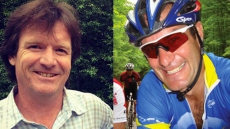VANCOUVER — Less than six per cent of groundwater in the upper two kilometres of the Earth is renewable within a human lifetime, a new study led by a British Columbia scientist reveals
Tom Gleeson of the University of Victoria led an international group of hydrologists in producing the first data-driven estimate of the world's total supply of groundwater. The study, published in "Nature Geoscience," found the essential resource is being used up far too quickly.
The researchers used a variety of datasets and models to discover the Earth's total volume of groundwater is about 23 million cubic kilometres, of which 0.35 million cubic kilometres is younger than 50 years old.
The Canadian Press recently spoke with Gleeson about his team's findings.
CP: Why should we care about groundwater?
Gleeson: The simplest answer is because over a third of humans drink groundwater every day and we use it for irrigated agriculture around the world. It's a hugely important, critical resource for both drinking water and for growing food.
---
CP: What's the difference between young and old groundwater and why does it matter?
Gleeson: Young groundwater is groundwater that is less than 50 years old. It's an arbitrary cutoff but it shows where groundwater has been recently renewed and will be renewed in the next 50 years. Old groundwater is often deeper and less accessible and often, but not always, has lower water quality. It can often be saline, even more salty than ocean water ... These things limit our ability to use this water for drinking water or for irrigating crops.
---
CP: What was your most significant finding?
Gleeson: The biggest finding we have is that less than six per cent of groundwater globally is renewable on this human lifespan timescale, so over 50 years. Yet, and this is kind of the interesting thing, this modern or young groundwater is actually three times larger than the volume of all the other freshwater in the Earth.

CP: What does this finding say to you?
Gleeson: The biggest implication is that these young groundwater resources are a finite resource that we need to protect and manage better. They're important because they're the most quickly renewed, yet they're also the most vulnerable or sensitive to both contamination from the surface and to climate change.
---
CP: Do you have a sense of where we're over-using groundwater?
Gleeson: Previous studies that myself and other people have done have documented where we're over-using ground water. Some of those places include northern India, northern China, Saudi Arabia, and in the United States, in the midwest, such as Kansas, Texas, and most recently in the news, in California.
---
CP: Does your study have any implications for Canada or B.C.?
Gleeson: B.C. has just recently passed a new Water Sustainability Act, which for the first time really regulates groundwater use in this province. Our groundwater studies are really important to show and to try to estimate how much groundwater we have and where we have it, and that can be used for how to better manage it. This is true across Canada. B.C. has just been a little bit behind the times, and now we're finally catching up to in developing groundwater regulations.
---
CP: Do you hope your study has an impact on policy-makers?
Gleeson: I hope it's a call and a reminder that our young and active groundwater is a finite resource that needs to be managed and protected into the future.




